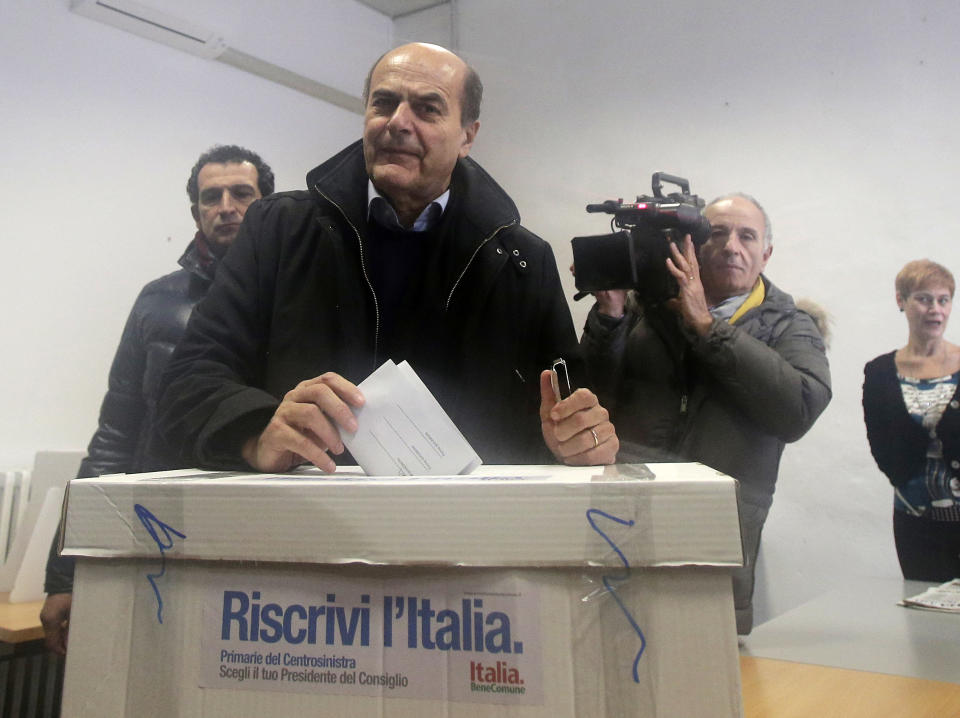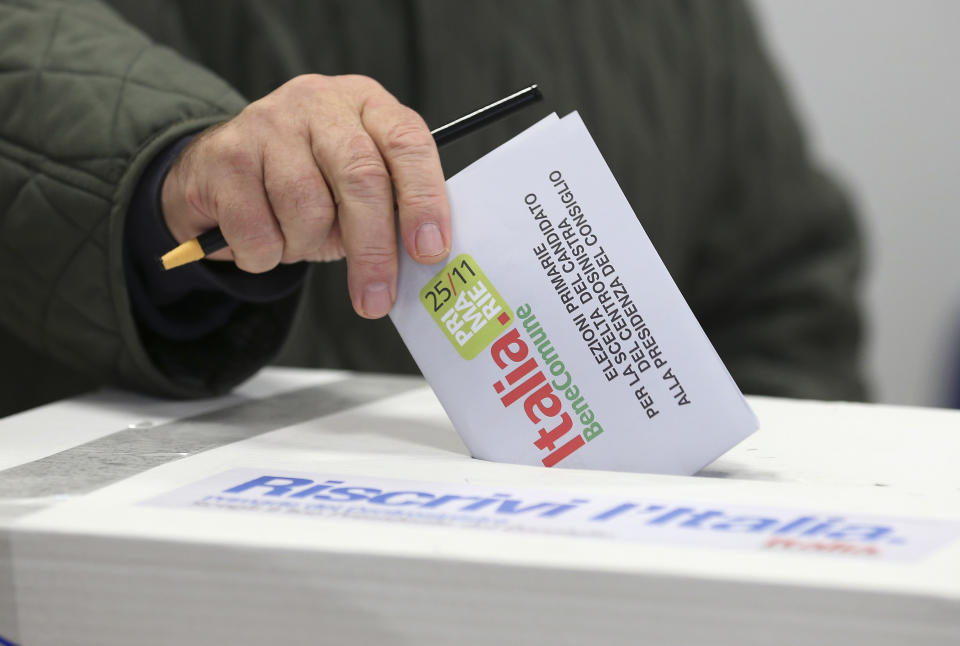Bersani wins Italy primary, heads to general vote
ROME (AP) — Pier Luigi Bersani, the head of Italy's main center-left Democratic Party, won a runoff primary Sunday to become the main center-left candidate for Italy's 2013 general elections — a vote that polls indicate could well be won by the Democratic Party given the utter disarray of the opposing center-right.
Preliminary results gave Bersani 60.8 percent of the vote compared to Florence Mayor Matteo Renzi's 39.1 percent, with two-thirds of the votes counted.
Even before the results were released, Renzi conceded the victory to Bersani in a Twitter message, writing: "It was the right thing to try, it was beautiful to do it together. Thank you all from the heart."
The primary had been closely watched since the Democratic Party has a significant lead in the polls over former Premier Silvio Berlusconi's center-right People of Freedom party, which has been in chaos following the media mogul's 2011 downfall, a series of corruption scandals within party ranks and Berlusconi's indecision over whether to run for a fourth term.
The 2013 general election — expected in March or April — will decide if Italy continues on the same path to financial health charted by Premier Mario Monti, appointed last year to save Italy from a Greek-style debt crisis. The former European commissioner was named to head a technical government after international markets lost confidence in then-premier Berlusconi's ability to reign in Italy's public debt and push through structural reforms.
Monti has ruled out running for office but has said he would be willing to stay on in some capacity if he could be of service. Some commentators have floated the idea of Monti taking over the largely ceremonial role as Italian president, while others say his talents would be put to better use as treasury minister.
Nearly all polls had projected Bersani would beat Renzi, who campaigned on an Obama-style "Let's change Italy now" mantra that attracted many disgruntled Italians back to politics. Renzi used his youth — he's 37 — to bolster his call for Italy's entire political class to be "scrapped."
Bersani, by contrast, is 61 and a veteran of previous center-left governments, where he has served as transport and industry minister. In his victory speech, Bersani made clear his new job running for premier would begin Monday with a trip to Libya, Italy's former colony, to meet with the government.
"I want Italy to retake its place in political, moral, cultural and economic terms in the Mediterranean," Bersani said to cheers.
But even in defeat, Renzi won a victory of sorts for having changed the Italian left — perhaps forever, analysts said. Renzi's perceived liberal conservative leanings within the center-left, while alienating the movement's hard-core communists, attracted Italians young and old who might otherwise never have voted, much less for a center-left candidate. He liked to say that he offered a different vision for the party, a different model.
"Even if he loses, as I think he will, he had an important renovation function within the party," Rome resident Pietro Marucci said Sunday as he voted for Renzi.
Renzi's style — moving around Italy in a motor home to meet crowds, addressing supporters in just a shirt and tie, no jacket — drew inevitable comparisons to President Barack Obama. But some analysts said he was simply not yet ready for the job of running Italy, and that his relaxed, fresh approach to politics isn't what Italy needs as it navigates through a grinding recession and near-record high unemployment and tries to tackle its enormous public debt of €2 trillion ($2.5 trillion).
"Italy certainly badly needs new faces, fresh faces," noted columnist Massimo Franco said. "But I think that between Renzi and Bersani, the big problem is also experience."
It remains to be seen what, if any, role Renzi will play in the campaign for general elections and how Bersani will try to capitalize on the support Renzi generated. In his speech, Bersani made clear he understood Renzi's base, saying that starting Monday he would give "new space" to the younger generations in the party.
Berlusconi had largely stayed out of the public spotlight for the past year — until recent weeks, when he announced he was thinking about running again, then changed his mind, then threatened to bring down Monti's government, and then went silent about his political plans.
His waffling has thrown his People of Freedom party into disarray, disrupting its own plans for a primary which is tentatively scheduled for Dec. 16.
A poll published Friday gave the Democratic Party 30 percent of the vote if the election were held now, compared with 19.5 percent for the upstart populist movement of comic Beppe Grillo. Berlusconi's party was in third with 14.3 percent. The poll, by the SWG firm for state-run RAI 3, surveyed 5,000 voting-age adults by telephone between Nov. 26 and 28. It had a margin of error of plus or minus 1.4 percentage points.
It's been quite a turnabout both for Berlusconi's once-dominant movement and the Democratic Party, which had been in shambles for years, unable to capitalize on Berlusconi's professional and personal failings.
___
Maria Grazia Murru contributed from Rome.
___
Follow Nicole Winfield at www.twitter.com/nwinfield






